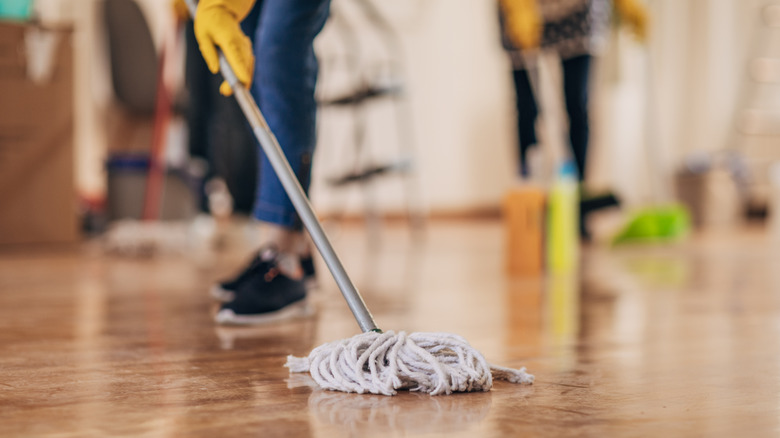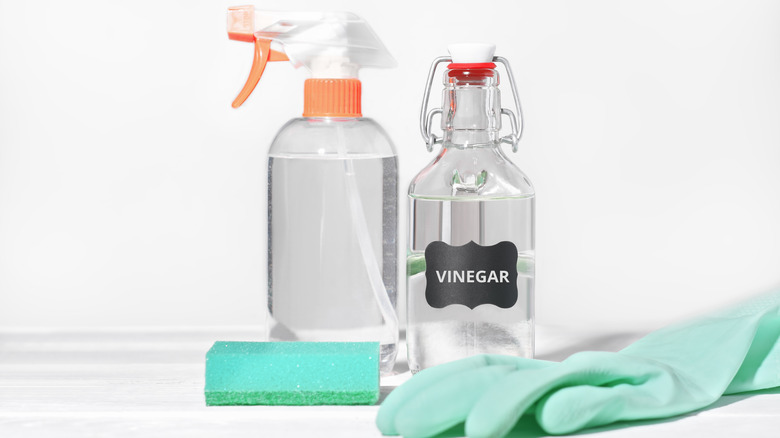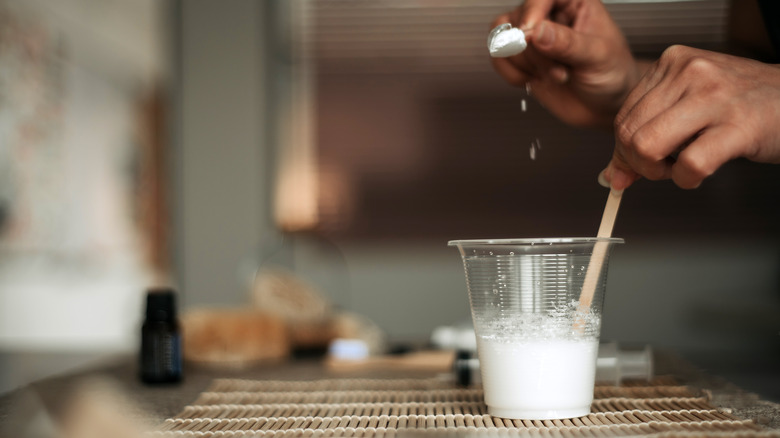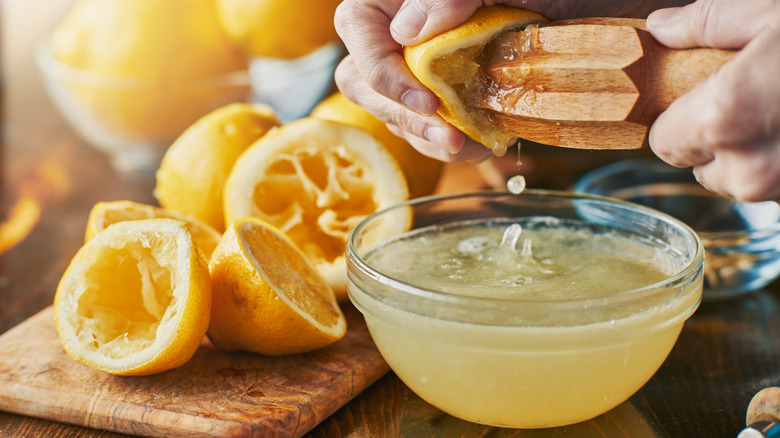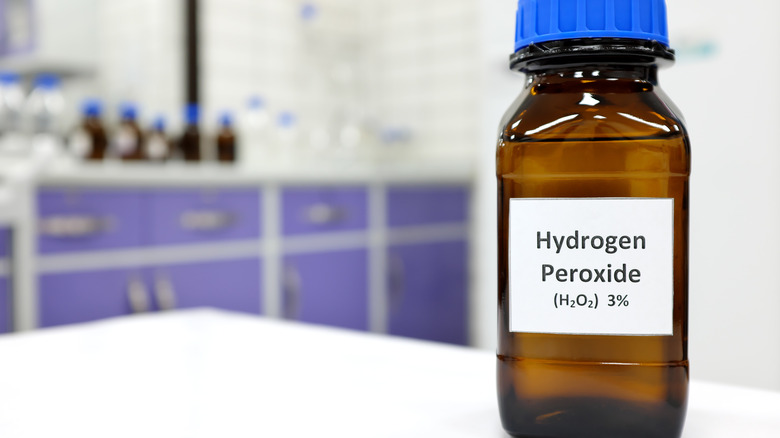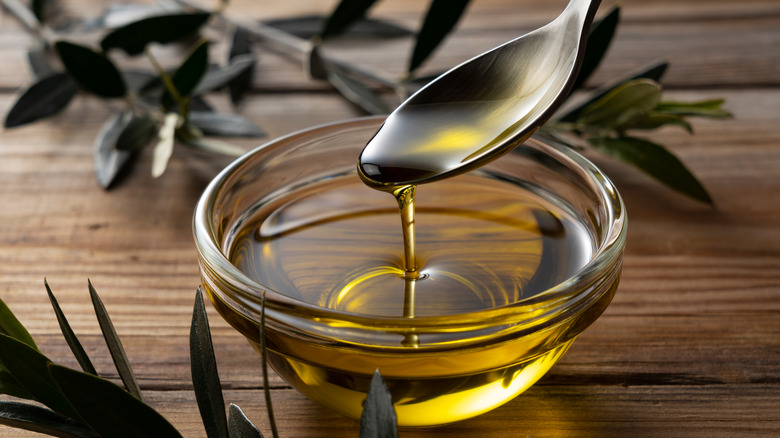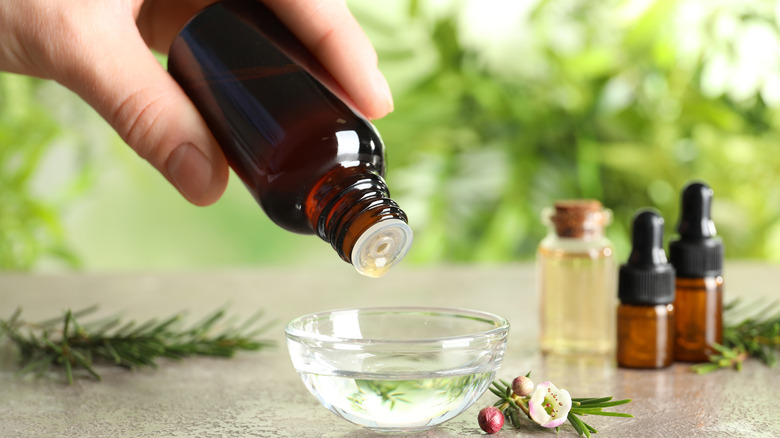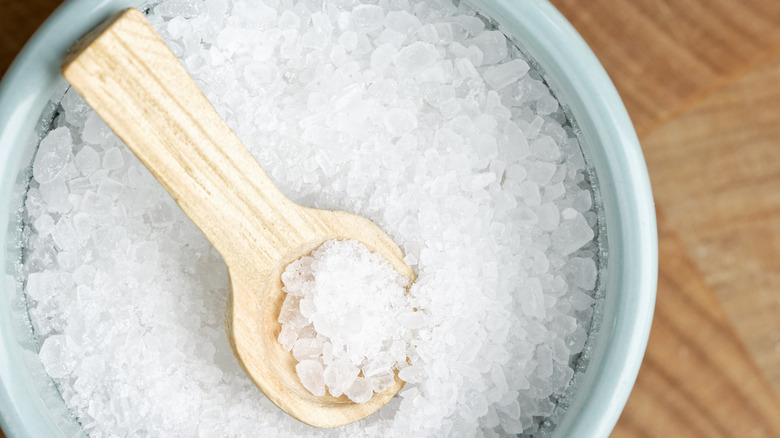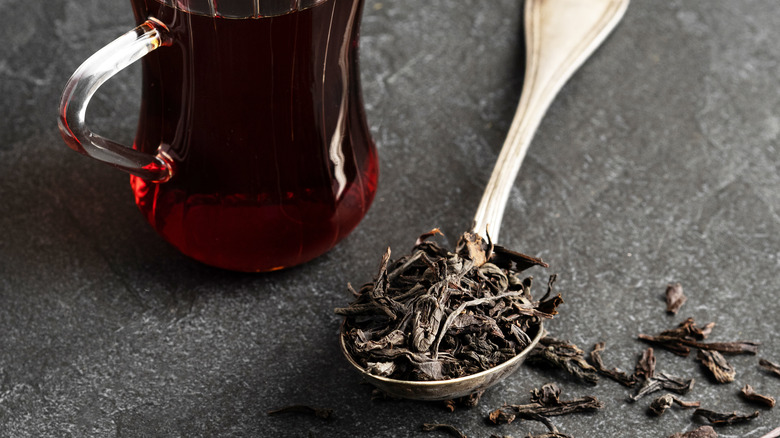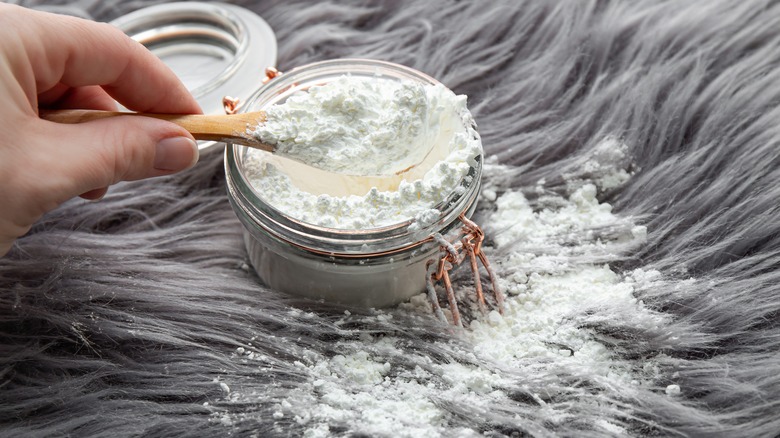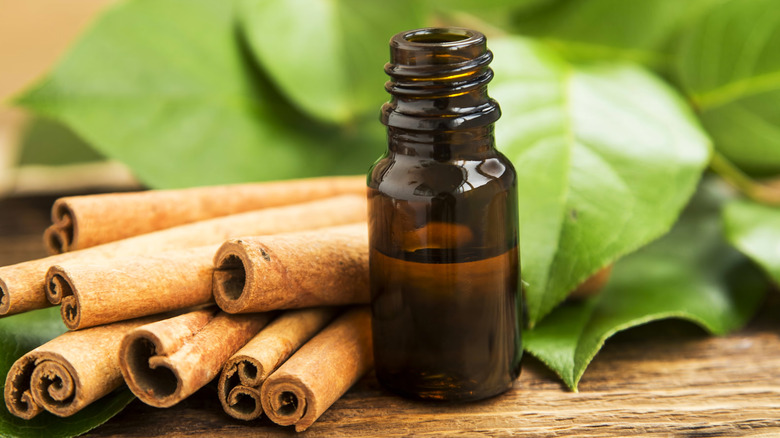Common Household Ingredients You Should Be Using To Clean Your Floors
Keeping dirty floors sparkling clean can be a daunting and expensive task, especially since they're the most-used surface in the home. Luckily, you likely already have the supplies you need. Behind the pantry doors lies the answers for cost-effective and surprisingly efficient alternatives to commercial floor cleaning products. Whether you're looking for something to cut through grease, shine hardwood, or quickly soak up spills on the carpet, you'll find a solution in the list below.
Before diving in, it's important to note that some of the items are acidic in nature, which may not be appropriate for all flooring. Although most recipes are diluted, the acidity can still eat through sealants and grouts on different types of material. While acidic cleaners are often safe on ceramic and porcelain tiles, you should avoid using them on most stone types. If you're unsure whether or not to use a product on your specific surface, test it out first. Find a hidden area of your floor and use the solution on a small spot. If there is any etching or discoloration, skip the method for that flooring.
Clean most floor types with vinegar
Vinegar is an ideal choice to help spruce up floors due to its acidic nature, allowing it to cut through dirt, grime, and grease. This common household ingredient also doubles as a natural deodorizer, making it great for removing unpleasant odors lingering on your floors. It's produced from a fermented liquid where bacteria called acetobacters combine with oxygen to create acetic acid. This acid neutralizes the bacteria or particles that cause unwanted odors. As vinegar evaporates, it takes these neutralized molecules with it, leaving no scent behind. The same acidity that makes this product an excellent odor eliminator can also damage some flooring types. Check with the manufacturer or do a small test spot before using a vinegar-based solution.
Prepare the mixture by combining equal parts water and white vinegar into a bucket. Dip your mop into the mixture, wring out any excess, and clean your floor as you usually would. It's best to work in sections, rinsing your mop frequently to prevent spreading dirt around. Let the vinegar and water blend sit for a few minutes to give it time to break down stubborn dirt or grime. Empty your bucket and replace it with fresh water. Go over your floor again to thoroughly rinse any vinegar left behind. Although vinegar has a harsh smell, it will dissipate after it evaporates.
Create a cleaning paste with baking soda
Baking soda, or sodium bicarbonate, is an ideal cleaning agent for floors because it's a mild alkali that can neutralize odors. Additionally, it's a slightly abrasive powder that helps dislodge particles and remove stains without being so coarse that it causes damage. While baking soda is safe and effective for most flooring types, avoid using it on hardwood floors, marble, and other stone surfaces. These materials can be sensitive to abrasives and may get scratched. Always test a small, hidden area to ensure the paste doesn't damage or discolor the surface.
To clean your floors with a baking soda paste, begin by sweeping or vacuuming to remove any debris. Mix a cup of baking soda and enough water to form a thick paste. Rub the mixture onto the floor, focusing on stubborn areas, and let it sit for a few minutes to give it time to break down any gunk. Use a mop to scrub the floor gently; applying too much pressure can ding up your floor. Once finished, rinse thoroughly to remove any residue or streaks left behind using a mop, cloth, or squeegee and bucket of water. Soak up any wet spots with a cloth. You can let the rest dry naturally or speed up the process using a rag on the entire floor.
Cut through grease with lemon juice
Like vinegar, freshly squeezed lemon juice effectively cuts through grease because of its high acidic content. Unlike vinegar, lemons have citric acid, which is a dissolving agent that can break up proteins found in viruses. Additionally, the citric acid acts as a natural degreaser and solvent; the acid breaks down greasy areas, making it a breeze to wipe away. Even better, lemons have a fresh scent, which is why many cleaning products have a citrusy fragrance. So, using this zesty fruit may be a better alternative for those sensitive to smells who can't withstand breathing in vinegar.
Remember, always try the lemon juice solution on a small flooring area before going over the entire surface. To create a lemony-fresh cleaning mixture, combine one part freshly squeezed lemon juice with two parts of water in a bucket. Stir the ingredients thoroughly to ensure a good blend of the two. Mop your floor entirely, carefully getting into all the nooks and crannies. Once you've wrapped up mopping, rinse the floor to eliminate any residue from the lemon mixture. Allow the floor to dry while enjoying the natural lemon scent.
Disinfect and remove stains with hydrogen peroxide
Hydrogen peroxide is extremely versatile and is an ingredient in an array of products, from acne creams and teeth whiteners to cleaners and stain removers. This potent disinfecting agent can clean and eliminate staining on various surfaces, including porous and non-porous ones. It breaks down tough spots at a molecular level, making it effective on several flooring types like wood and carpet. Because it possesses antiviral, antibacterial, and antimicrobial properties, it also makes a reliable disinfectant.
To create a mopping solution, combine one cup of hydrogen peroxide with a gallon of water in a bucket. Use a microfiber mop or nonabrasive cloth to wipe the floor, working in sections. Dry each area immediately after wiping. To target specific stained areas, use the same mixture in a spray bottle and spray the affected spot. You can even make a carpet cleaner with hydrogen peroxide, though make sure to dilute it so there's no more than 6% concentration. A high level of peroxide can discolor fabrics, so test an unseen patch of carpet before using it on the entire floor.
Shine your floors with olive oil
Hardwood floors look gorgeous in nearly every home, making them one of the most popular flooring types even today. The once beautifully shining surface can dull over time, so you'll need to polish them every now and then to revive them. Olive oil is a natural solution with nourishing properties that bring out the wood's natural shine while adding a protective layer to the surface, helping preserve its appearance. It's important to note that you should only use olive oil as a polisher sparingly to avoid making floors slippery. This is a decent option for shining up the occasional scuff, but due to its slippery nature and the tendency of olive oil to go rancid, we don't recommend using it to polish your entire floor.
To polish scuffed or dull areas of your hardwood floor, start by sweeping or vacuuming to remove any dust or debris from your floor. This step is crucial as any leftover particles can scratch the wood while polishing. Create the solution by combining ¼ cup of olive oil, ⅓ cup of white vinegar, 5 cups of hot water, and a few teaspoons of essential oil for a fresh scent. Add the mixture to a spray bottle and apply throughout the entirety of the floor. Use a soft cloth or microfiber mophead to polish the floors. Ensure you wipe away any excess solution once you're finished.
Disinfect and add a fresh scent to your home using tea tree oil
Although most people use a few drops of essential oils for aromatherapy, some oils, like tea tree, have other added benefits. Tea tree oil contains compounds like terpinene, cineole, and pinene, which work together to provide an antimicrobial effect. Additionally, studies show tea tree oil is effective against viruses because of its antibacterial, antifungal, and antiviral properties. Although essential oils are safe for nearly all surfaces, using them correctly is crucial; it only takes a few drops to get the job done. Using a high concentration can dissolve the protective coating, causing damage to sensitive flooring. It's important to note that it can be toxic to cats and dogs, so use it with caution if you have any pets.
Add a few drops of tea tree oil to a bucket of warm water to add a kick of dirt-busting power with an aromatherapeutic scent. Ensure the floor is free of dust and debris by sweeping or vacuuming before mopping with the solution. Dip the mop in the bucket and scrub your floors as you typically do. Once finished, use a dry mop to wipe the excess to prevent leaving residue on the surface. This step is crucial because if large amounts of water seep into your floor, you'll wind up with water damage.
Absorb spills on the carpet with salt
Even the most careful of homeowners and renters will have to deal with the dreaded feeling of spilling something on the carpet. Because of its ionic properties, salt is a helpful ingredient to absorb fluids out of the fibers. Different methods are more suitable depending on what lands on the floor. Use paper towels to absorb most of the moisture for liquids like a dropped coffee cup or tipped wine glass. Then, sprinkle a generous amount of table salt over the area to absorb any remaining moisture. Give the salt plenty of time to latch onto the spill, and use a vacuum cleaner to remove the salt from the carpet. From there, you can use your preferred carpet cleansing solution to remove any staining.
You can also use salt to tackle the oil from fallen grease. Apply the salt immediately on hard surfaces and let it soak the way you would like a liquid spill. Once it's soaked in, use a cloth to wipe it away. There'll likely be some leftover residue that you can now easily take care of with some dish soap and a wet rag. Grease mixed with carpet is a bigger job to tackle, so you'll need another ingredient to get it done. Mix one part salt with four parts rubbing alcohol to create a paste. Dip a damp cloth into the mixture and rub the stain until it lifts out. Let the solution dry before vacuuming up the salty remnants. You may need to repeat this process a few times before the oil is fully removed.
Use black tea as a hardwood floor cleaner
Black tea is not only an energizing beverage but an effective cleaning agent for hardwood floors. With this one secret ingredient, you'll get the best of both worlds with a solution that disinfects and brilliantly stains your floor. Because of the polyphenolic compounds found in the Camellia Sinensis plant, which black tea is made from, it can prevent microbial growth. The tannins within the tea offer incredible grease-fighting ability and dissolve dirt on contact. Additionally, they create a light brown stain, bringing out natural warm tones in your flooring.
Bring ½ a gallon of water to a boil and steep eight bags of black tea for 10-15 minutes. After steeping, press out any remaining liquid from the bags into the pot before discarding them. Take the pot off the burner and let it sit until it cools to room temperature. Before applying the solution, test a small, inconspicuous area on your floor. Dip a rag into the solution, wring it out, and apply it to the floor. Go along the wood grain's direction, using it sparingly as you go. Use a dry rag to soak up any leftover tea, keeping it from soaking in and potentially damaging your flooring.
Sprinkle cornstarch to remove tough stains on carpet
A common pantry staple, cornstarch, is made by extracting corn grains and then grinding them into a powder. As the name suggests, this starchy ingredient is incredibly absorbent, making it the perfect go-to when taking care of a spill. The molecules in this household product, amylose and amylopectin, are porous in nature, soaking up more than just fallen liquid — cornstarch absorbs odors, too. With so many benefits and nearly no cons, you can use cornstarch as a spot treatment or as a routine odor-controlling measure. All you need to do is sprinkle it all over your carpeted areas, let it sit, and vacuum as usual to keep stinky smells at bay.
To remove liquids from your carpet, heavily sprinkle cornstarch on the affected area. It's crucial to act fast so the powder can start absorbing immediately. Let it sit for several minutes, giving it ample time to soak everything up. Then, you can vacuum to suck up the stain-absorbed powder. If there is some discoloration left behind, mix cornstarch with enough white vinegar to form a thick paste. Rub the mixture into the stained area and let it sit until it's hardened. Chip away at it until you fully remove it, and use a vacuum to lift the cornstarch chunks.
Add cinnamon to your mop water to deter ants
There's no smell quite as sweet as that of freshly baked desserts. Cinnamon is a close runner-up, though, and it offers plenty of benefits when used in your mop water. It's a natural insecticide that works well as an ant repellant — especially when it's all over your floor. Although people often enjoy cinnamon's fresh scent, ants despise it, prompting them to run the other way. If it's concentrated enough, this spice can even be fatal to ants, causing them to suffocate. It also contains some antibacterial properties. So, with just one extra ingredient, you can have a powerful, ant-repelling floor cleaner without using any harsh chemicals.
To create this fragrant mop water, boil 1 gallon of water with 2-3 cinnamon sticks. If you don't have any sticks, substitute them with 2-3 teaspoons of ground cinnamon. Once boiling, take the pot off the stove and let it cool before adding it to your mop bucket. For extra potency, add a few drops of cinnamon essential oil to the solution. If you plan to only use the essential oil, you'll need about 15 drops for the entire bucket. Important to note, however, is that while ground cinnamon is not toxic to dogs, its essential oil can be.
